This post may contain affiliate links at no additional cost to you. As an Amazon Associate I earn from qualifying purchases. Click to view our full disclosure.
What's inside
Are you trying to gain muscle or even bulk on a budget? In this article, I’ll share 20 cheap, high calorie foods that can help you gain weight. Best of all, they’re rich in both nutrients and flavor!
As a dietitian, I understand that gaining weight in a healthy way can be a lot harder than you might think. This is a common goal for a lot of people, whether they’re currently bulking, trying to increase muscle mass, or even addressing health concerns that require weight gain.
Rather than binge-eating empty calories, I recommend focusing on nutritious, high calorie foods that contribute to mass gains and your health overall.
Keep reading to delve deeper into high-calorie foods, their benefits, and how to incorporate them into your diet. You’ll also learn what ingredients to opt for, what you can use as supplements, and which foods to avoid.
Who is weight gain for?

Many think weight gain is just for athletes and bodybuilders. However, there are so many other reasons you may be here.
Weight gain can be beneficial for those that are underweight, recovering from an illness or surgery, seeking to build muscle, or just looking to improve overall health.
Sometimes, weight gain can be a part of eating disorder recovery, hormonal imbalance, or disease treatment. No matter the reason, there’s something here for you.
What do healthy high-calorie foods include?
Related: 15 Best High Calorie Breakfast Ideas
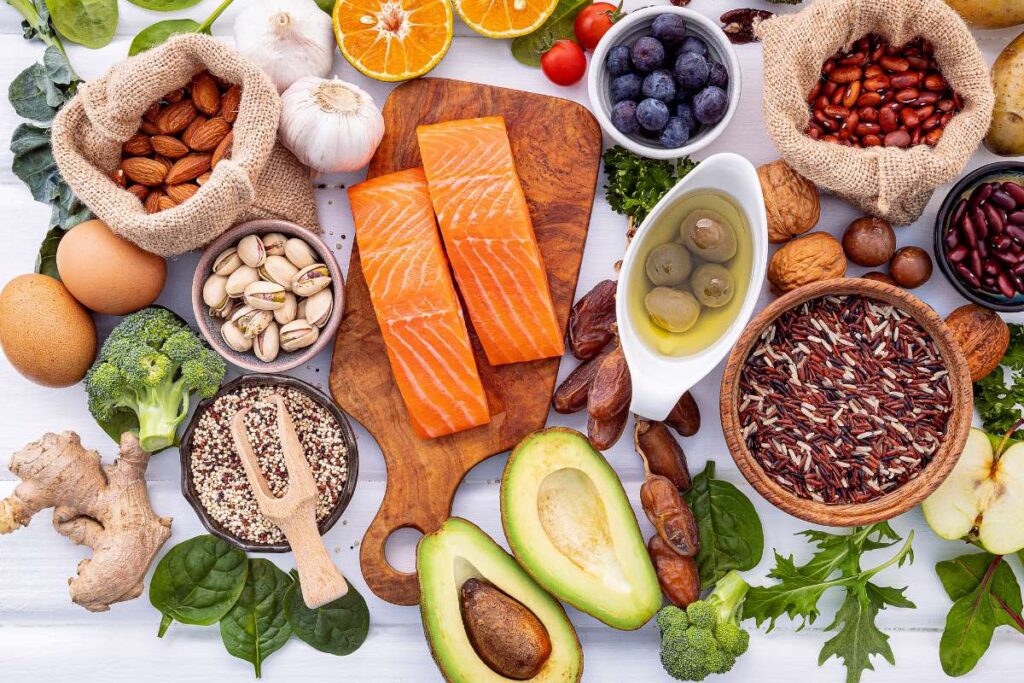
I think it’s common knowledge that not all high-calorie foods are equal. By focusing on healthy weight-gain foods, you can ensure that the mass you put on is predominantly muscle.
They can also help you gain in a sustainable way and offer nutrition outside of just calories.
Nutrient-Density
High-calorie foods should not just be “empty calories” with little to no nutritional value.
Instead, they should be rich in essential nutrients, providing macronutrients like protein, carbs, and fat, as well as micronutrients, or vitamins and minerals. This offers a high nutrient-to-calorie ratio, which can promote health benefits.
Low Volume
Not only should high calorie ingredients be nutrient-dense, but they should be energy-dense as well.
This means they provide more calories per portion. By providing more energy at lower volumes, these foods can help you increase your caloric intake without feeling overly full or bloated.
Essential Nutrition
Healthy high calorie foods are rich sources of nutrients like vitamins, minerals, antioxidants, and other bioactive compounds.
At each meal and snack, you’ll also want to make sure you’re getting a balance of essential macronutrients to help with things like blood sugar balance, nutrient deficiencies, energy, and focus.
Foods To Avoid When Seeking Weight Gain – Even If They Are Calorie-Rich
Related: Best 12 Week Carb Cycling Meal Plan For Fat Loss (With PDF)
Now that we know what makes up healthy high-calorie foods, let’s dive into what we call “empty calories”.
Refined Sugar
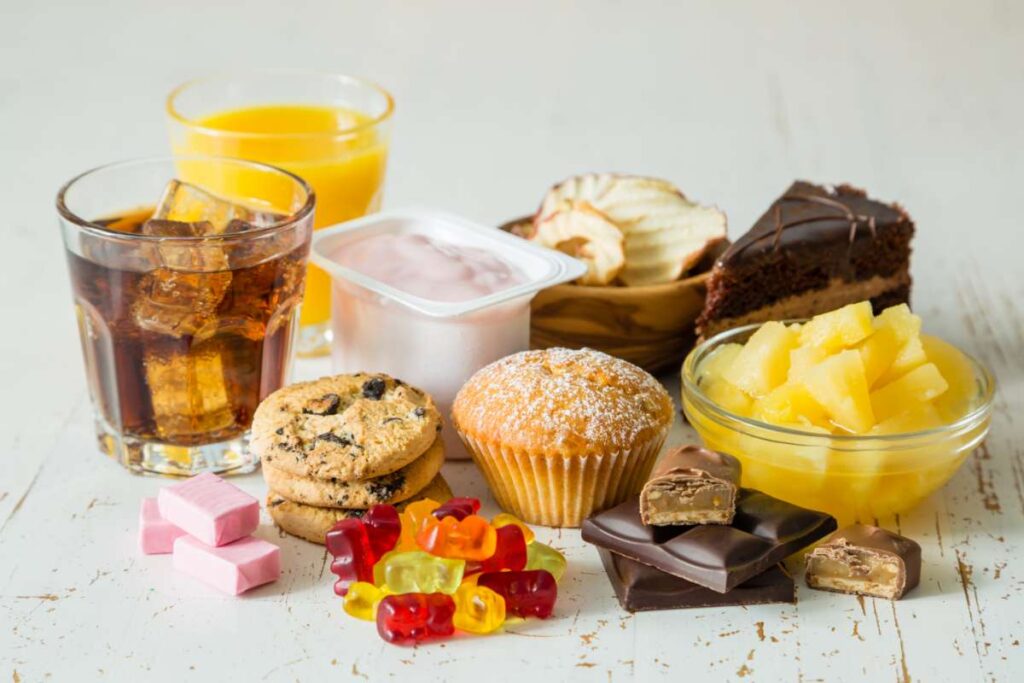
Foods high in refined sugars, such as candy, soda, and pastries, are very high in calories but lack vitamins, minerals, and other nutrients.
So, they have the ability to lead to rapid weight gain but can also contribute to health issues like insulin resistance, fluid retention, and chronic diseases. Refined sugars also won’t help with muscle gains as they are very low in protein.
Trans & Saturated Fats
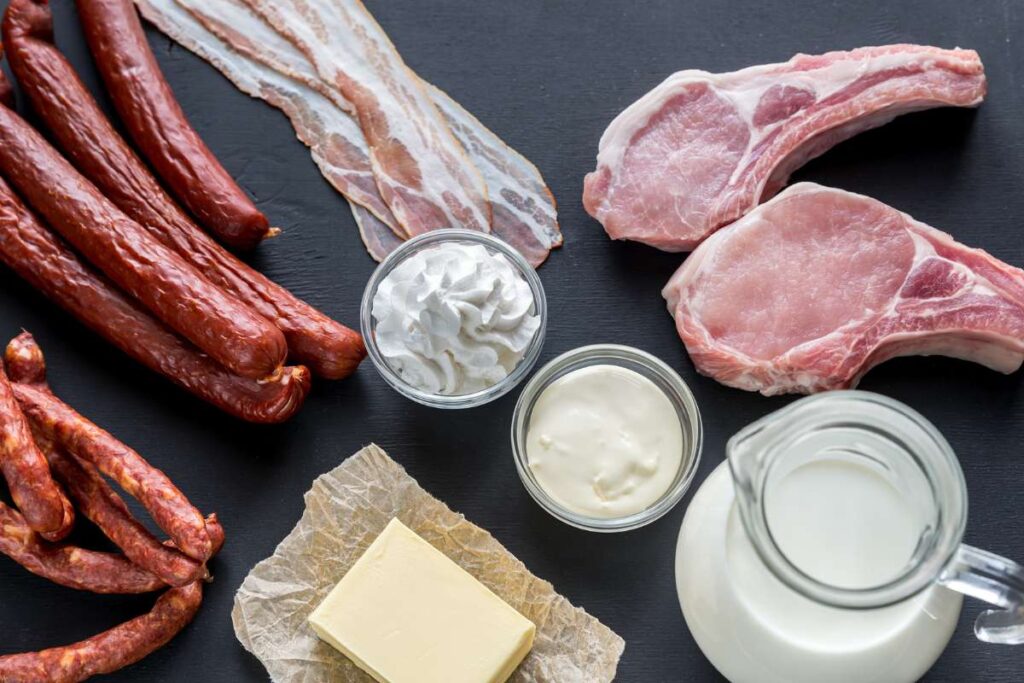
While fats are an important part of a balanced diet, you’ll want to choose healthy fats like nuts, olive oil, and avocados over saturated and trans fats from processed foods.
In general, you should avoid trans fats because they have been directly linked to heart disease. Limit saturated fats from animal meat and dairy as they can increase inflammation.
Super High Fiber
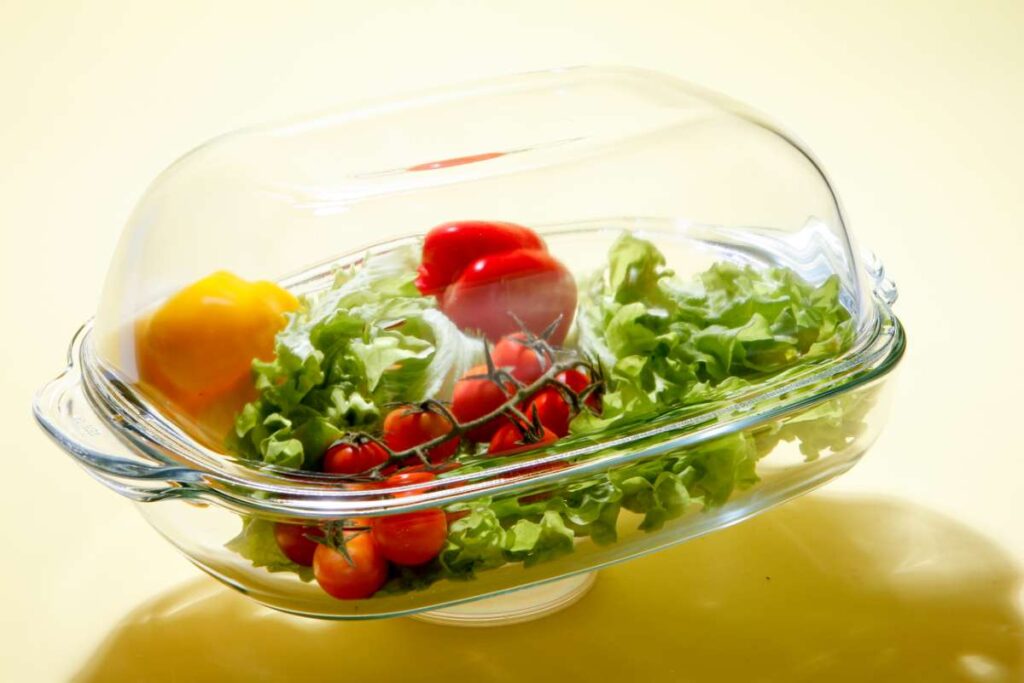
Ingredients extremely high in fiber, such as raw vegetables and fruit with tough skins, may be filling but make it challenging to eat enough calories. Opt for moderate fiber intake and choose cooked or blended versions of these fibrous foods.
Lots of Volume
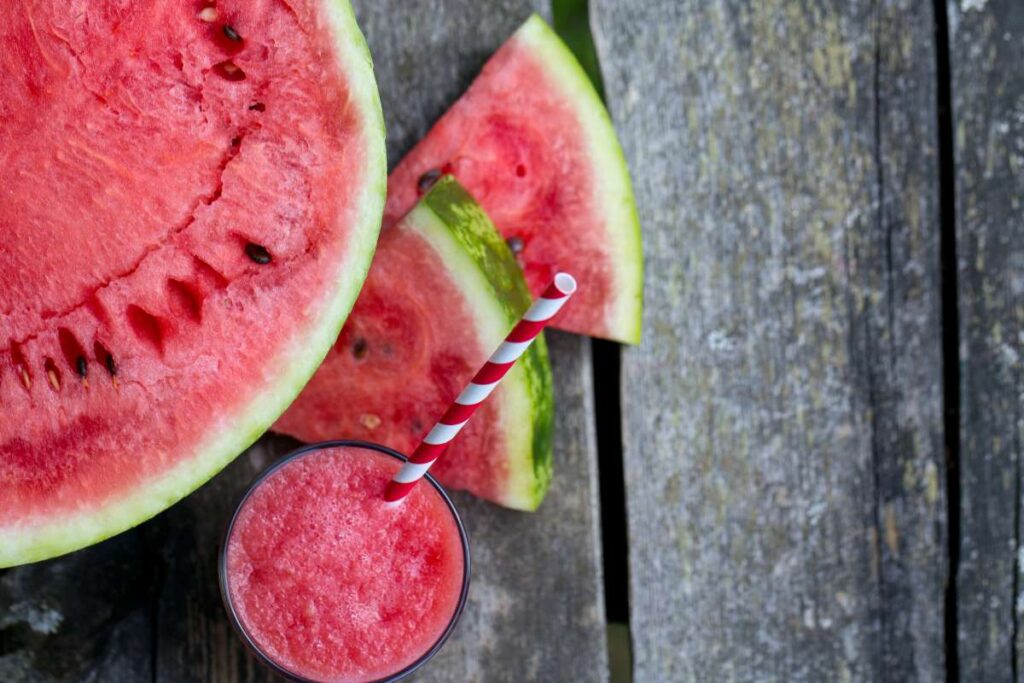
Foods with low energy density and high volume, like watery fruits or leafy greens, can fill up your stomach without providing a substantial amount of calories or nutrition.
While these are super healthy, you’ll want to balance your intake of them with more energy-dense options.
20 Cheap High-Calorie Foods for Bulking
Related: 1500 Calorie Meal Plan PDF
Here’s my consolidated list of 20 budget-friendly foods for weight gain. Keep reading for more details!
- Peanut Butter
- Whole Milk
- Oats
- Rice
- Pasta
- Bananas
- Eggs
- Chicken Thighs
- Ground Beef
- Cottage Cheese
- Nuts
- Lentils
- Avocado
- Greek Yogurt
- Sweet Potatoes
- Olive Oil
- Whole Wheat Bread
- Cheese
- Canned Tuna
- Beans
20 High-Calorie Cheap Foods
Related: 2100 Calorie Meal Plan PDF
1. Peanut Butter
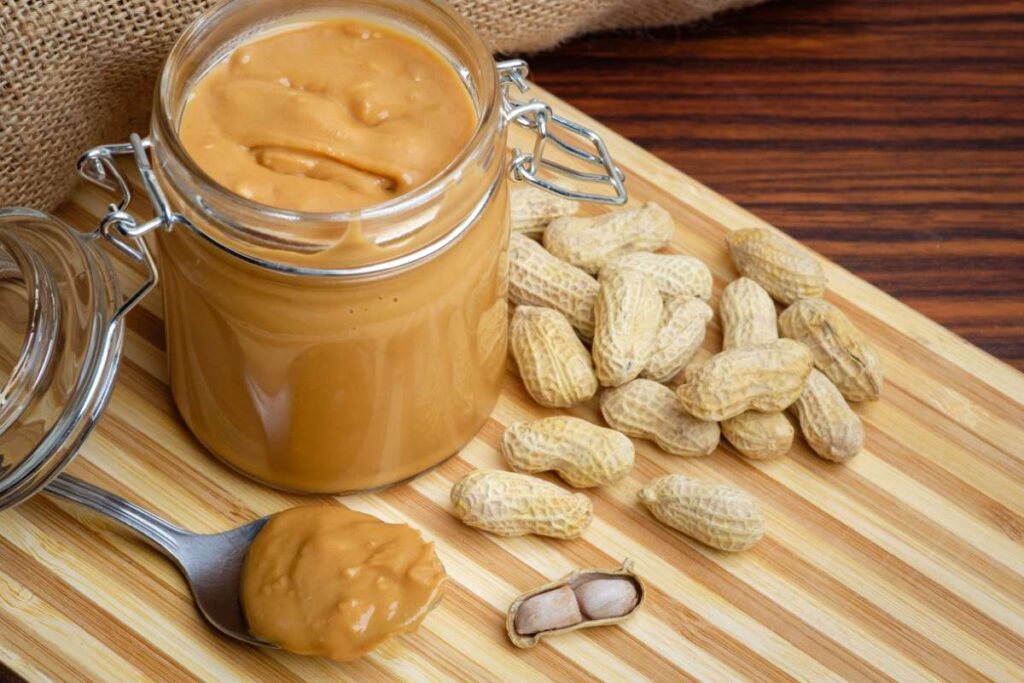
Peanut butter is high in both fat and protein and is an excellent spread or addition to snacks, breakfasts, or lunches.
It’s a good source of healthy monounsaturated fats, which have been shown to reduce bad cholesterol. It also provides essential minerals like vitamin E, magnesium, and potassium.
A little goes a long way, so even a regular-sized jar can last you a while. Just make sure you choose a peanut butter that only lists peanuts on the ingredients list; avoid added oils and sugar.
- Nutritional Facts (Based on 100g): 588 Calories, 20g Carbohydrates, 25g Protein, 50g Fat
- How to Consume: Spread peanut butter on toast, add to smoothies or oats, or serve with fruit.
- Price per lb: $2.40
2. Whole Milk
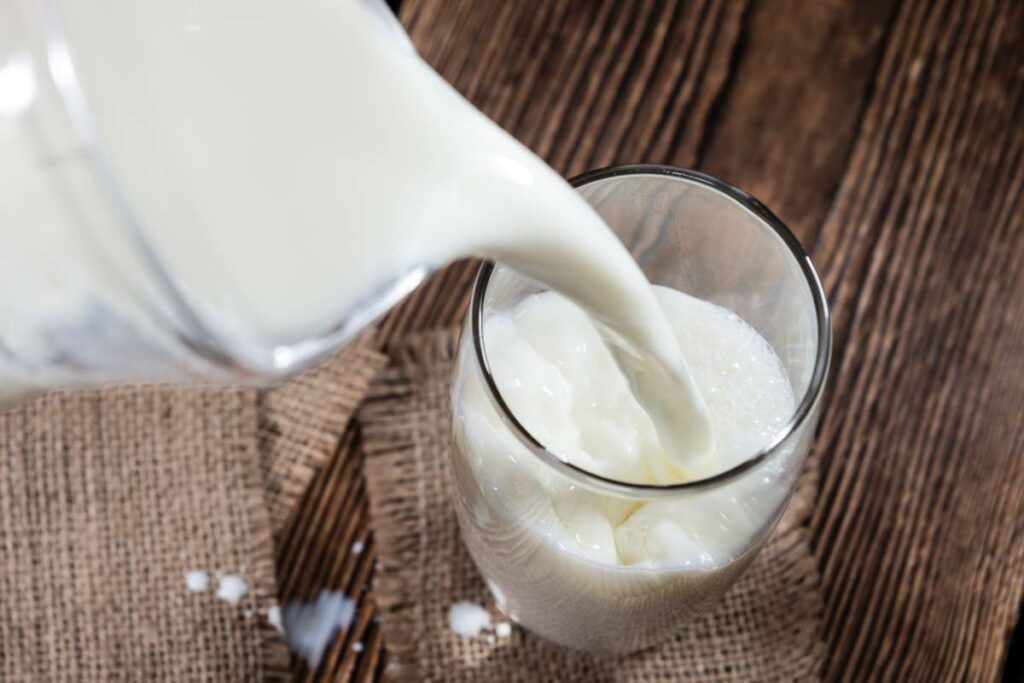
Whole milk is the highest-calorie milk option because none of the fat has been removed. It offers a good balance of carbs, protein, and fat, as well as nutrients like calcium, vitamin D, and vitamin B12.
Whole milk is known for its benefits for bone health and muscle function.
- Nutritional Facts (Based on 100g): 61 Calories, 4.8g Carbohydrates, 3.2g Protein, 3.3g Fat
- How to Consume: Drink whole milk on its own or use it in smoothies, shakes, or hot beverages. You can also use it in place of water to make oatmeal or protein shakes.
- Price per lb: $0.59
3. Oats
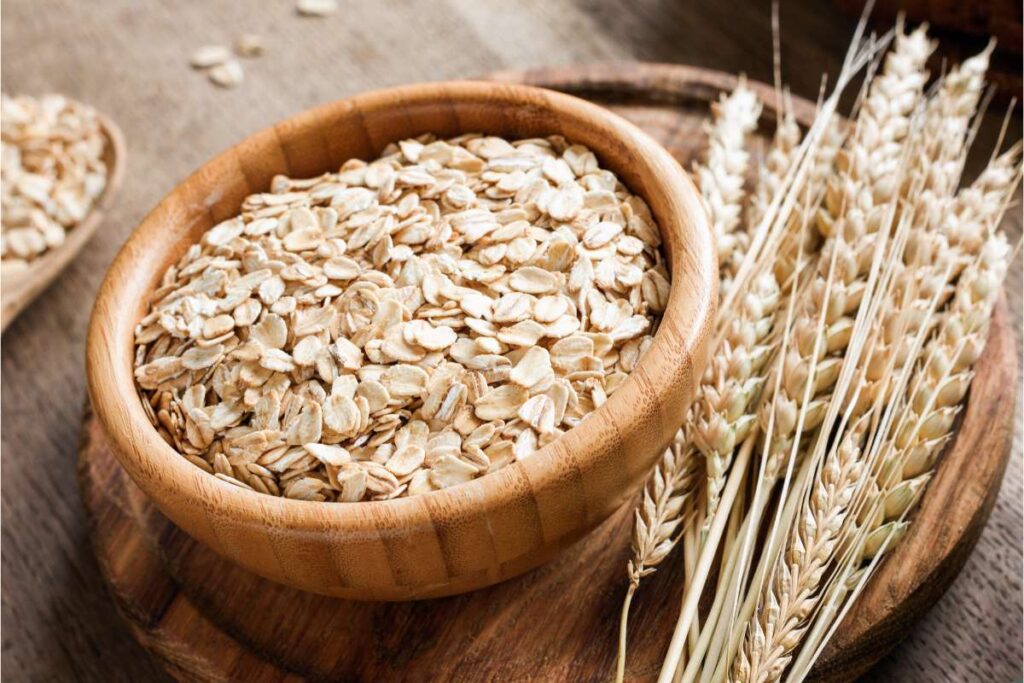
Oats are a nutrient-dense whole grain high in complex carbohydrates and protein. These complex carbs include soluble fiber, which has been shown to help lower cholesterol levels and promote heart health.
As a bonus, oats are naturally gluten-free.
You can usually buy oats in bulk for a very low price. Any type works, so feel free to go for quick, whole, steel-cut, etc. However, I find quick oats are the easiest to prepare.
- Nutritional Facts (Raw, based on 100g): 68 Calories, 12g Carbohydrates, 2.4g Protein, 1.4g Fat
- How to Consume: Prep with whole milk or add toppings like nuts, seeds, dried fruits, or yogurt to add more calories. You can also blend it into smoothies or use it as a base for granola bars.
- Price per lb: $1.52
4. Rice
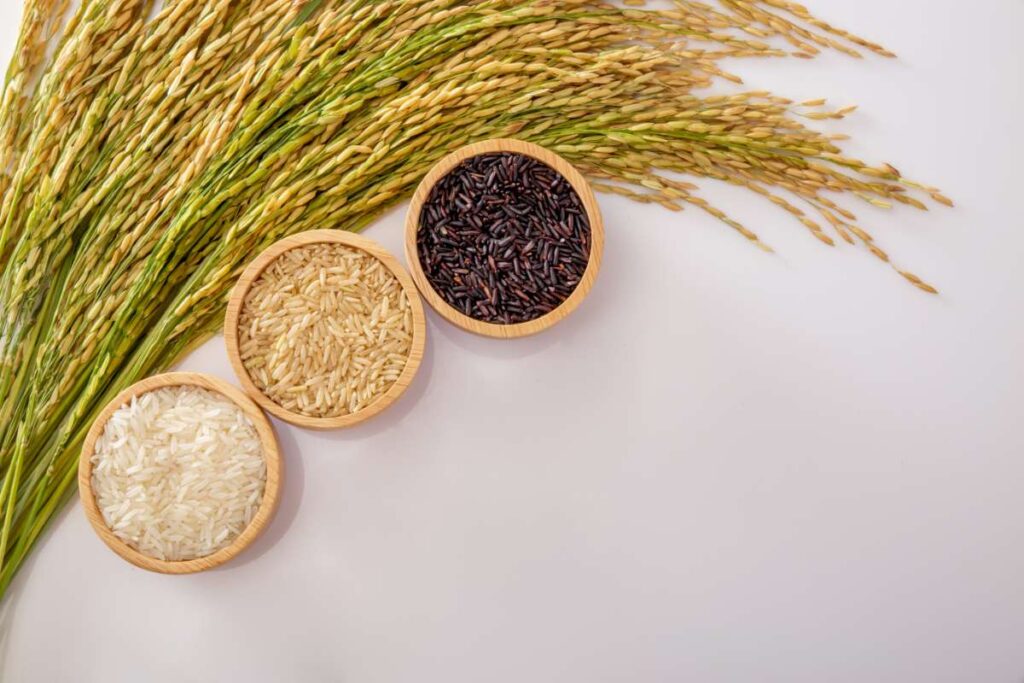
Rice is an affordable, versatile, and calorically-dense staple in many diets. It provides carbohydrates for energy and can be used as a base or addition to many meals. Rice also contains essential vitamins and minerals such as B vitamins and iron.
While brown rice is a higher fiber option, any type of rice (white, basmati, jasmine, wild, etc.) is a good option to help with weight gain.
- Nutritional Facts (Raw, based on 100g): 365 Calories, 80g Carbohydrates, 7g Protein, 0.7g Fat
- How to Consume: Serve rice as a side dish, use it as a base for stir-fries or grain bowls, or make rice pudding for dessert!
- Price per lb: $0.70
5. Pasta
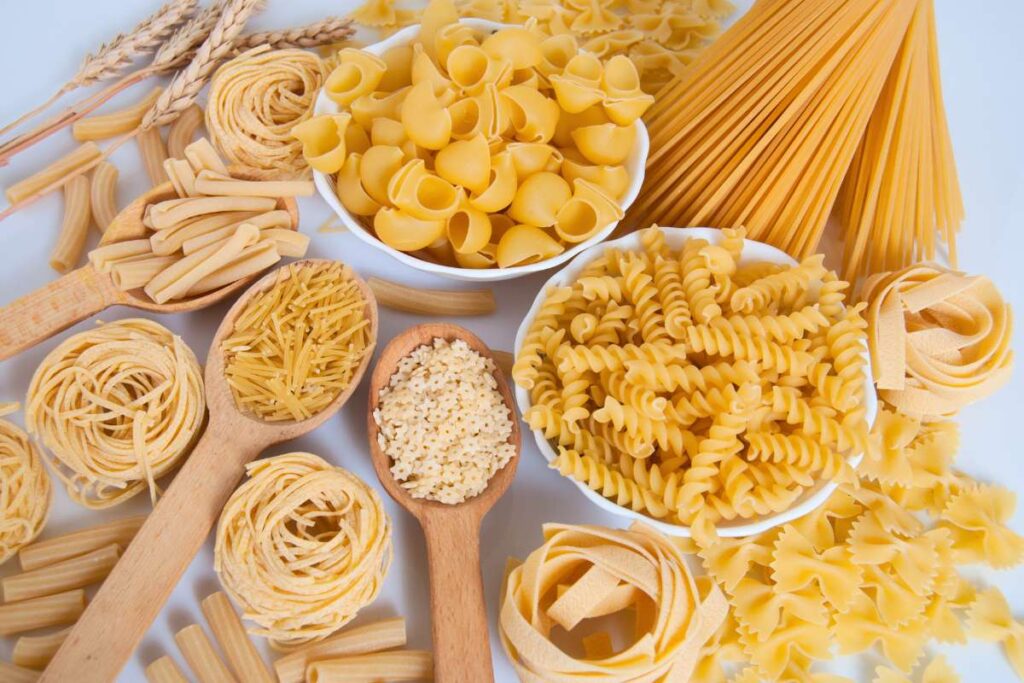
Pasta is another versatile, high-calorie staple that can act as a budget-friendly base for many types of meals. Pasta provides carbohydrates that can help sustain energy and is a good source of B vitamins, iron, and selenium.
Whole-grain pasta offers more fiber, however, plain pasta can still help you reach your goals. If you are gluten-free, chickpea pasta is a great, high-calorie, high-protein alternative.
- Nutritional Facts (Dry, based on 100g): 371 Calories, 75g Carbohydrates, 13g Protein, 1.5g Fat
- How to Consume: Serve pasta with rich sauces, means, or cooked vegetables with cheese or olive oil to increase the calories. You can also make pasta salad with tuna and mayonnaise or pine nuts.
- Price per lb: $1.18
6. Bananas
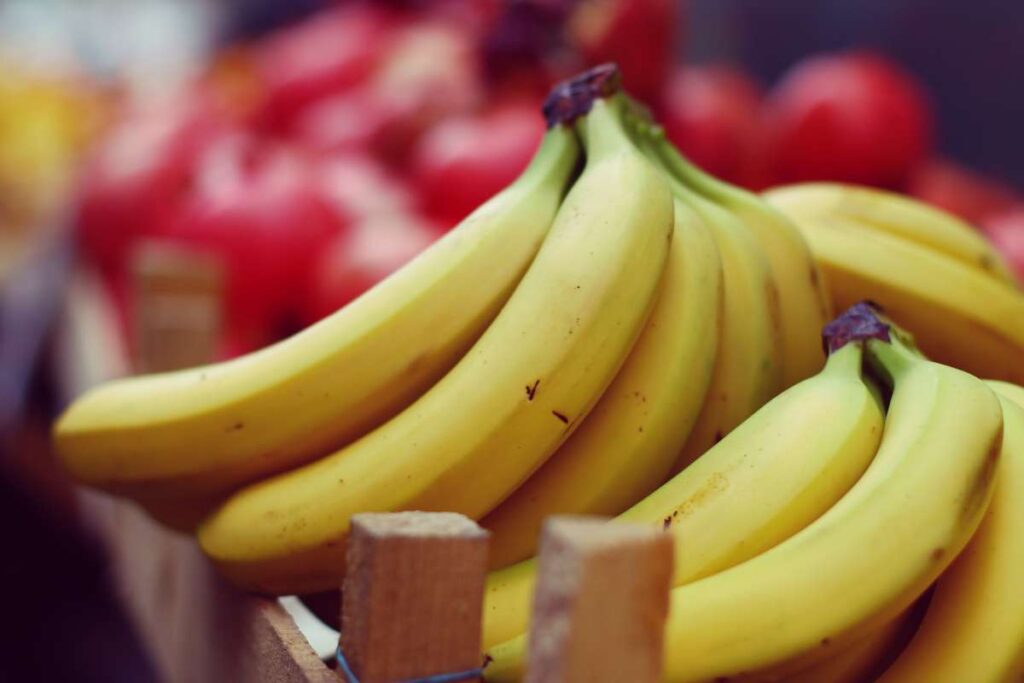
Bananas are one of the cheapest and calorically dense fruits on the market. They’re also very versatile and convenient to pack as a snack.
Bananas are well-known for their high potassium content and can also offer antioxidants and carbohydrates quick energy. Bananas also provide health benefits like better digestion and heart health.
- Nutritional Facts (Based on 100g): 89 Calories, 23g Carbohydrates, 1.1g Protein, 0.3g Fat
- How to Consume: Eat bananas as a standalone snack, add them to smoothies or milkshakes, or pair them with peanut butter on a sandwich.
- Price per lb: $0.58
7. Eggs
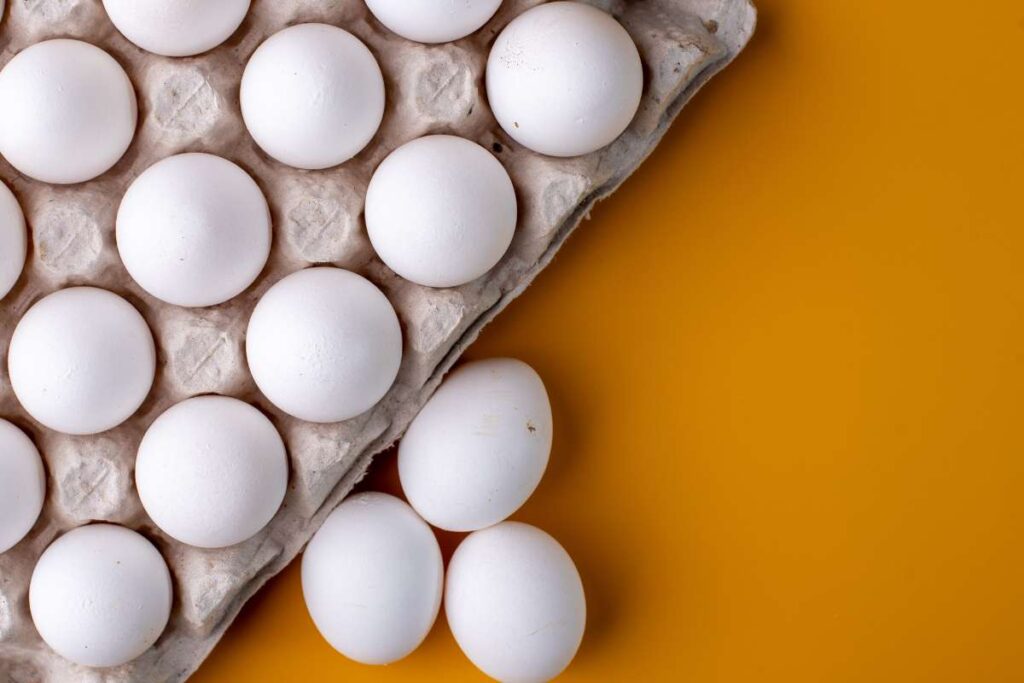
Even though egg prices had recently gone up, they’re back down and still a budget-friendly option for weight gain.
Eggs are a great source of choline, which is important for brain health. Two antioxidants known for eye health, called lutein and zeaxanthin, are also present in eggs.
Don’t skip on the yolks, though. That’s where most of the calories and nutrition come from.
- Nutritional Facts (Based on 100g): 143 Calories, 0.7g Carbohydrates, 13g Protein, 10g Fat
- How to Consume: Enjoy the whole egg scrambled, poached, or fried for breakfast or hard boil to meal prep for snacks.
- Price per lb: $1.42
8. Chicken Thighs
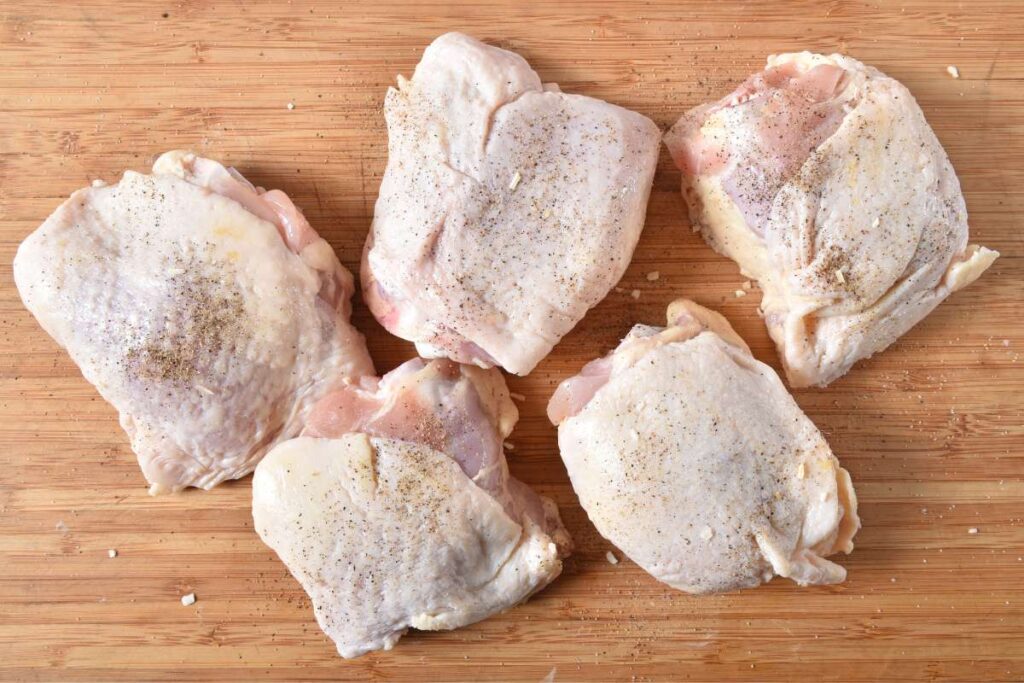
Chicken thighs are a more calorically-dense cut of chicken than the breast and are a staple in cheap bulking meals.
They are higher in calories because they have more red fibers, or myoglobin, which provides more fat, vitamins, and minerals.
Choosing chicken thighs with skin-on will add even more calories, mainly from fat.
- Nutritional Facts (Based on 100g): 177 Calories, 0g Carbohydrates, 24g Protein, 8g Fat
- How to Consume: Bake, grill, or pan-fry chicken thighs with olive oil, seasonings, and sauces for added flavor. Pair with grains or potatoes and veggies for a balanced meal.
- Price per lb: $2.62
9. Ground Beef
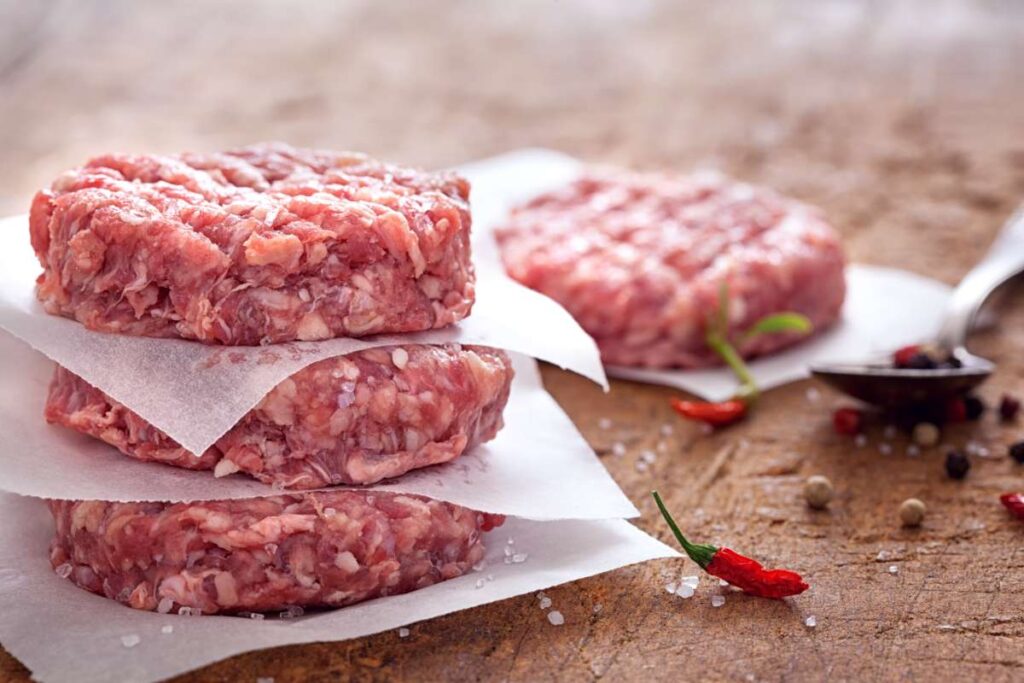
Ground beef is a cheap, high-calorie ingredient that can be used in various recipes. It’s a significant source of both protein and fat, as well as micronutrients like iron, vitamin B12, and zinc.
Research shows micronutrients in beef can promote enhanced muscle growth and testosterone in male athletes.
The higher the percentage of fat, the higher the calories, so choose an 80/20 or 70/30 ratio.
- Nutritional Facts (Based on 100g): 332 Calories, 0g Carbohydrates, 14g Protein, 30g Fat
- How to Consume: Use ground beef to form burgers and meatballs or stir it into pasta sauce or chili. You can also cook it in a skillet as a taco or burrito filling.
- Price per lb: $5.26
10. Cottage Cheese
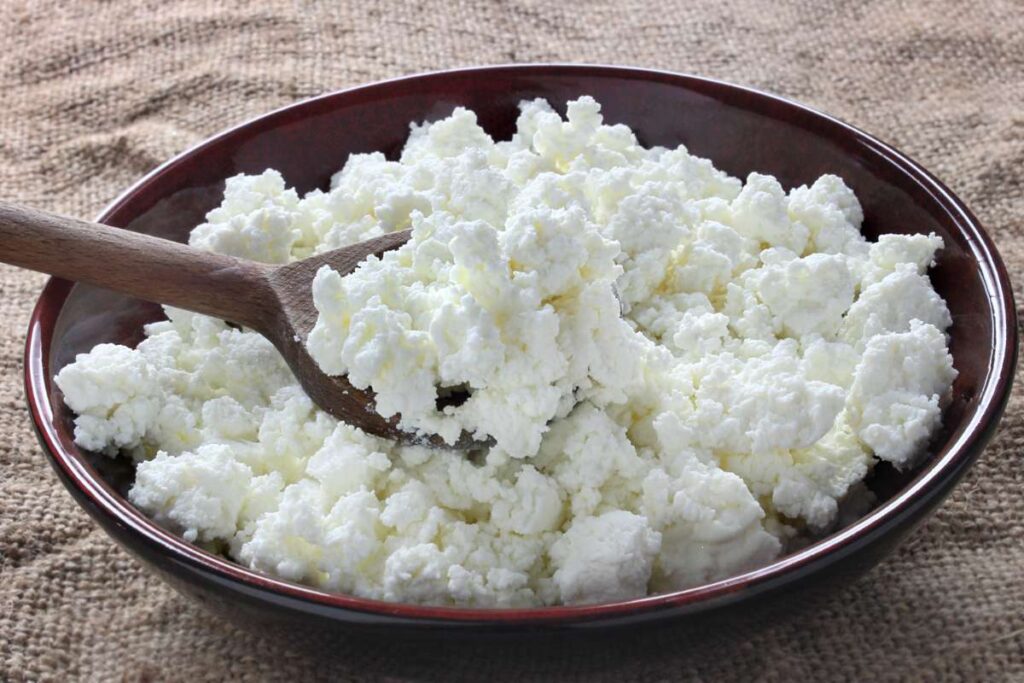
Although cottage cheese is trending on TikTok right now, it has always been a cheap and healthy source of calories. It is a good source of casein protein, which provides a steady release of amino acids to help with muscle growth and energy.
There is no difference in nutrition for small curds vs. large curds. However, you’ll want to go for the highest fat percentage (usually 4%) for the most calories per serving.
- Nutritional Facts (Based on 100g): 98 Calories, 3.4g Carbohydrates, 11g Protein, 4.3g Fat
- How to Consume: You could follow the TikTok trend and whip it for a creamy texture, or you can eat it as is. Top it with nuts, granola, or fruit for more flavor and calories. Or. spread it on toast as a creamy topping.
- Price per lb: $1.73
11. Nuts
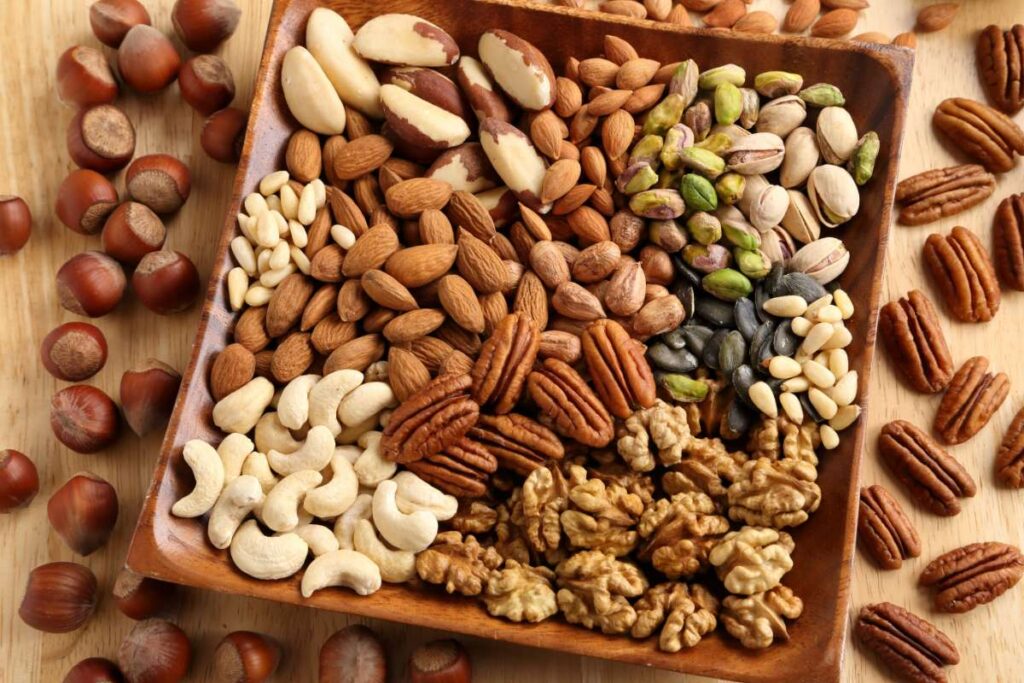
Nuts offer a combination of healthy fats, protein, and minerals like magnesium and selenium. They also provide fiber and antioxidants, which can help immune function.
All nuts are nutrient-dense but may offer unique vitamins and minerals, so feel free to eat various kinds to cover your bases.
- Nutritional Facts (Based on 100g): 607 Calories, 21g Carbohydrates, 20g Protein, 54g Fat
- How to Consume: Make a nut mix or trail mix to get a variety of nuts in one bite. Or, throw a handful onto a salad, bowl of oatmeal, or yogurt cup for more calories.
- Price per lb: $6.10
12. Lentils
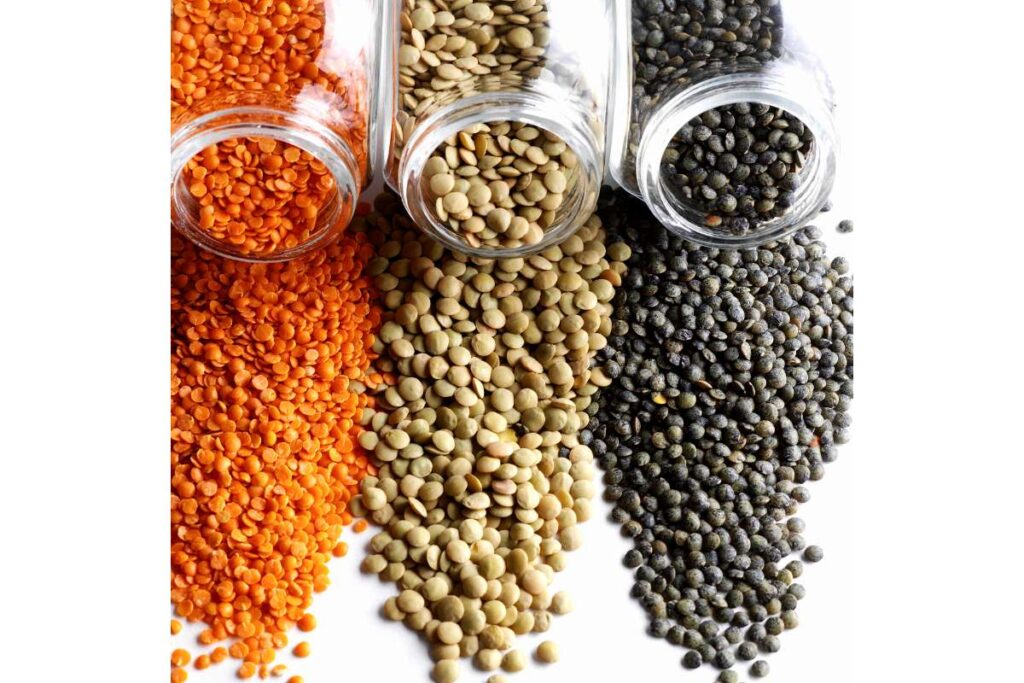
Lentils are a rich source of plant-based protein, making them a good choice for vegetarians or vegans looking to gain weight. Lentils come in a variety of colors, including green, red, brown, and black; each having its own unique flavor and texture.
That being said, all are pretty cheap and good for weight gain.
- Nutritional Facts (Based on 100g): 353 Calories, 60g Carbohydrates, 26g Protein, 1.1g Fat
- How to Consume: Incorporate cooked lentils into soups, stews, curries, or salads. You can also blend them into dips or spreads.
- Price per lb: $1.30
13. Avocado
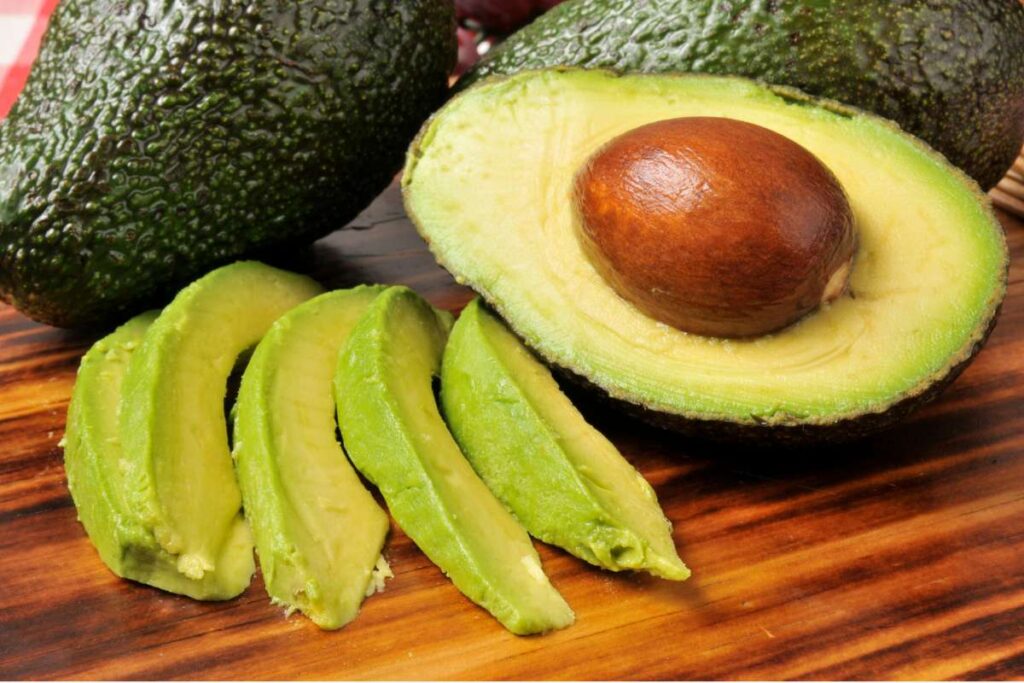
Avocado is one of the most calorically dense fruits and can be pretty budget-friendly when in season. They’re known for their creamy texture and high fat content, which comes from healthy monounsaturated fats.
They have been shown to improve cardiovascular health and cholesterol levels.
Other nutrients in avocados include fiber, potassium, magnesium, and vitamins C, E, and K.
- Nutritional Facts (Based on 100g): 160 Calories, 8.5g Carbohydrates, 2g Protein, 15g Fat
- How to Consume: Spread mashed avocado on toast, sandwiches, or wraps. Or, use them to make guacamole or top on a salad. You can also blend them into smoothies or use them as a butter or mayo substitute in recipes.
- Price per lb: $2.50
14. Greek Yogurt
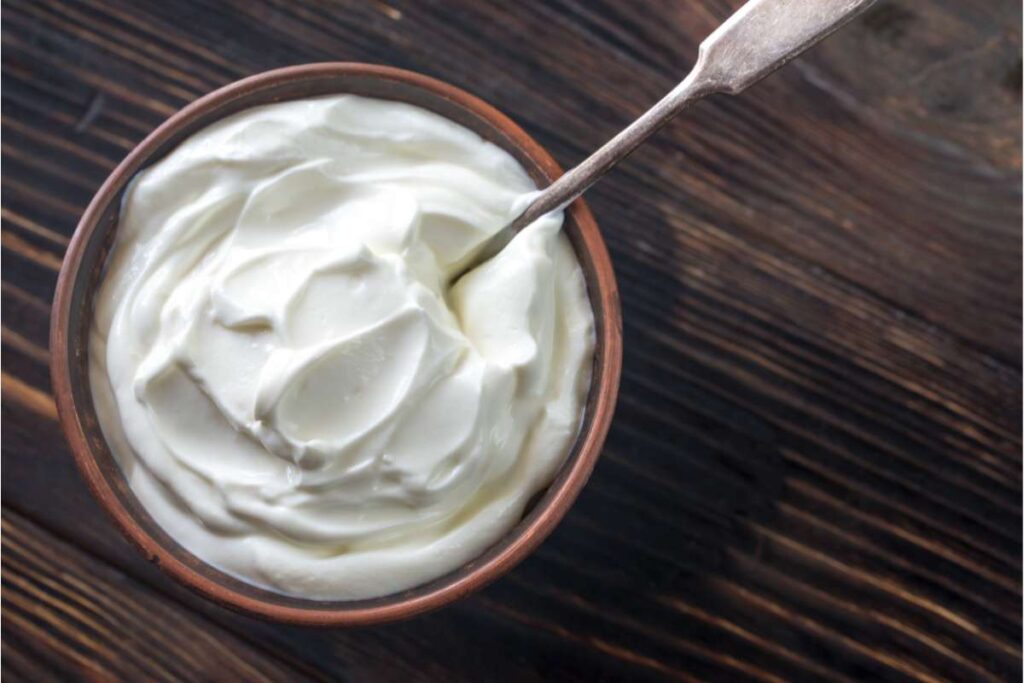
Greek yogurt is a rich and creamy base or addition to many meals. It’s a good source of protein, calcium, and probiotics, which means it supports muscle gains, bone density, and gut function.
While it’s more expensive than normal yogurt, each serving is more calorically dense, so a little goes a long way.
- Nutritional Facts (Based on 100g): 97 Calories, 4g Carbohydrates, 9g Protein, 5g Fat
- How to Consume: Eat Greek yogurt as a snack or mix it with fruit, granola, or nuts for breakfast. You can also use it as a base for smoothies or freeze it for frozen yogurt.
- Price per lb: $1.97
15. Sweet Potatoes
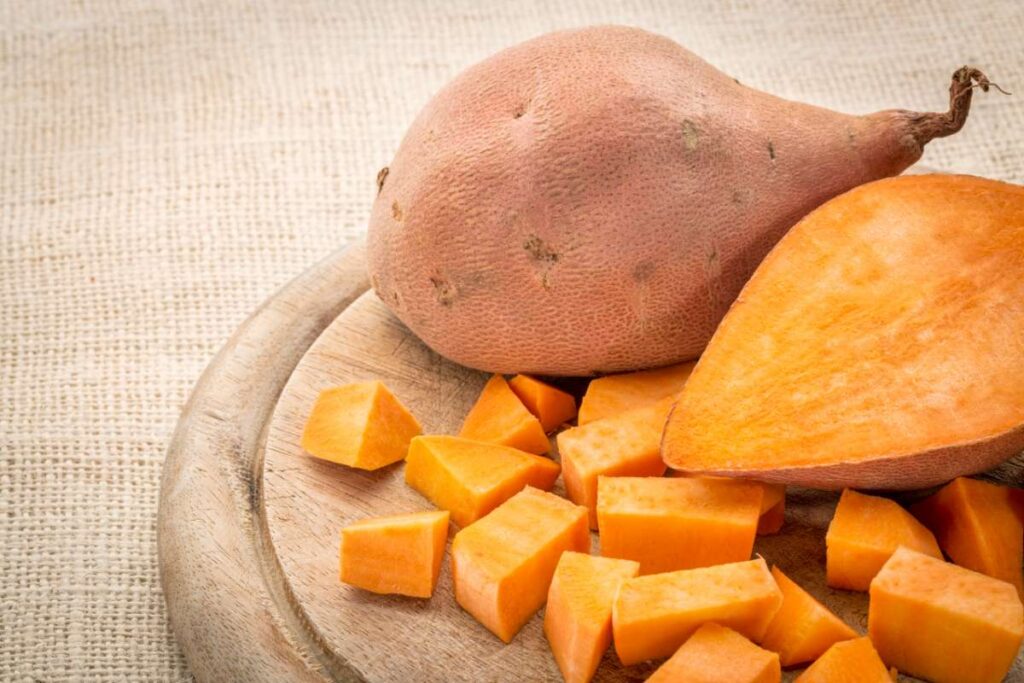
Sweet potatoes are a naturally sweet root vegetable that can be a valuable addition to a weight gain diet. They provide complex carbs, fiber, and nutrients like potassium, vitamin A, and vitamin C.
Each potato also possesses antioxidant and anti-inflammatory properties, which may help reduce your risk for chronic diseases in the long run.
Potatoes in general are a good and cheap source of nutrition for weight gain. However, sweet potatoes have a lower glycemic index, so they may help balance blood sugars more than regular potatoes would.
- Nutritional Facts (Based on 100g): 86 Calories, 20g Carbohydrates, 1.6g Protein, 0.1g Fat
- How to Consume: Bake or roast sweet potatoes and serve as a base or side dish. Or, mash them and mix into soups, stews or casseroles.
- Price per lb: $1.44
16. Olive Oil
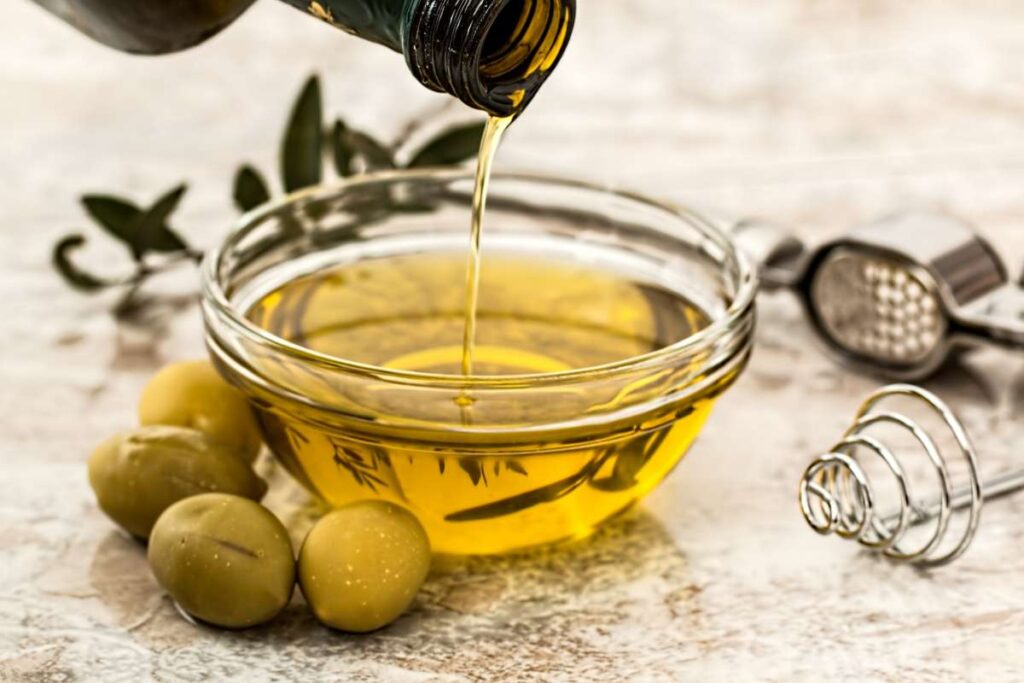
Olive oil is one of the most popular oils on the market, known for its health benefits and light flavor. It is a monounsaturated fat that is also rich in antioxidants and anti-inflammatory compounds that are linked to improved gut health, cardiovascular health, and cognition.
While cold-pressed extra virgin olive oil is one of the most nutrient-dense forms, it’s also the most expensive. Just basic olive oil still offers many benefits and has a cheaper price tag.
- Nutritional Facts (Based on 100g): 884 Calories, 0g Carbohydrates, 0g Protein, 100g Fat
- How to Consume: Use olive oil as a dressing for salads, drizzle over meat or vegetables for roasting, or toss with pasta. You can also mix it with vinegar and herbs to make a homemade vinaigrette.
- Price per lb: $3.36
17. Whole Wheat Bread
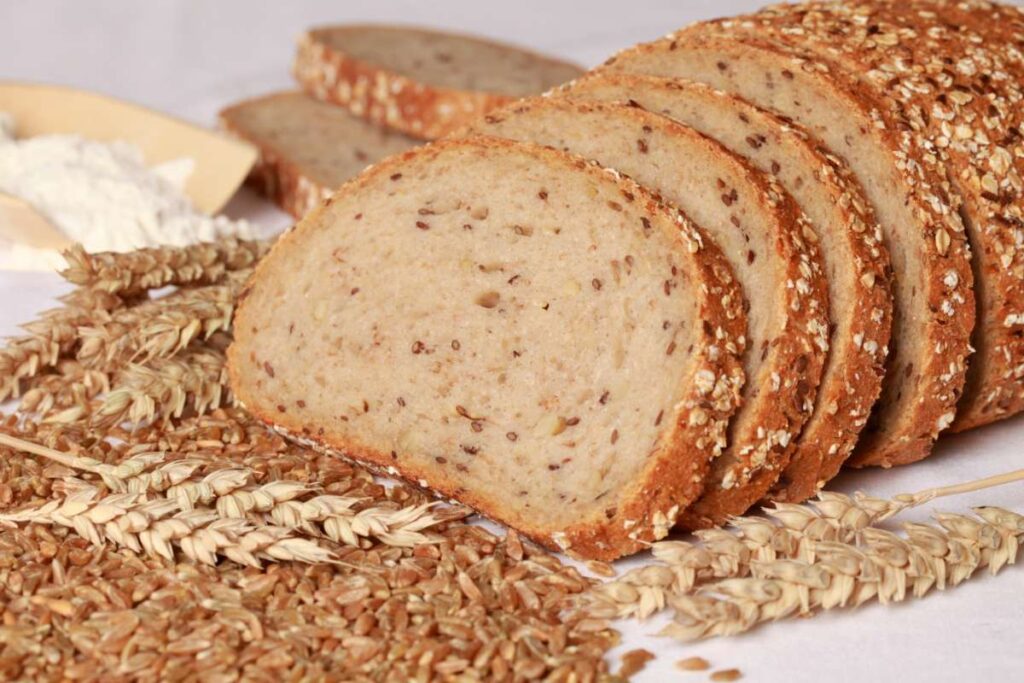
Bread often gets a bad rap, but whole grains of any type can offer health benefits and help you reach your health goals.
Whole wheat bread is a great, budget-friendly source of calories, complex carbs, and B vitamins. Research even shows that whole grain products are linked with a reduced risk of chronic diseases like heart disease and type 2 diabetes.
- Nutritional Facts (Based on 100g): 247 Calories, 41g Carbohydrates, 13g Protein, 3.4g Fat
- How to Consume: Toast and top with peanut butter, avocado, or butter. Or, use it as a base for sandwiches.
- Price per lb: $1.12
18. Cheese
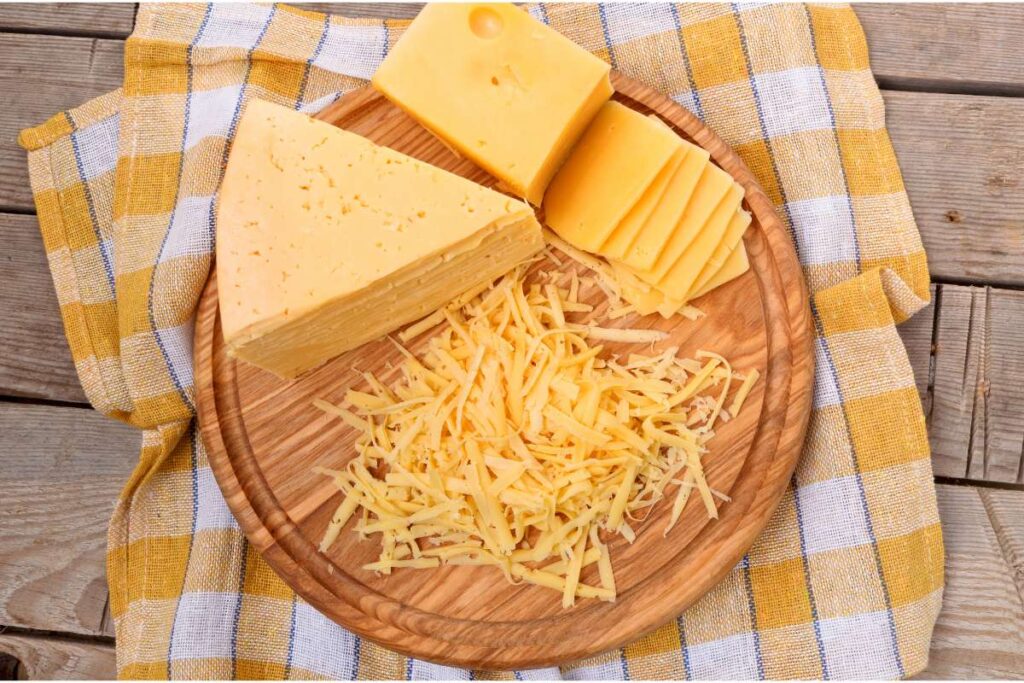
If you like cheese, you’re in luck! Cheese is a healthy high-calorie food that can be added to many dishes to help you increase your caloric intake.
While all cheeses can add extra calories to your plate, you’ll want to go for cheaper, higher-fat cheeses like parmesan and cheddar. This way, you get the most energy density for your budget.
- Nutritional Facts (Based on 100g): 400 Calories, 1.3g Carbohydrates, 25g Protein, 33g Fat
- How to Consume: Top wraps, sandwiches, salads, pasta, or chili with cheese to easily add more calories. Or, you can melt it on top of a casserole or cooked meat. I also like to pair it with crackers or fruit as a snack.
- Price per lb: $3.86
19. Canned Tuna
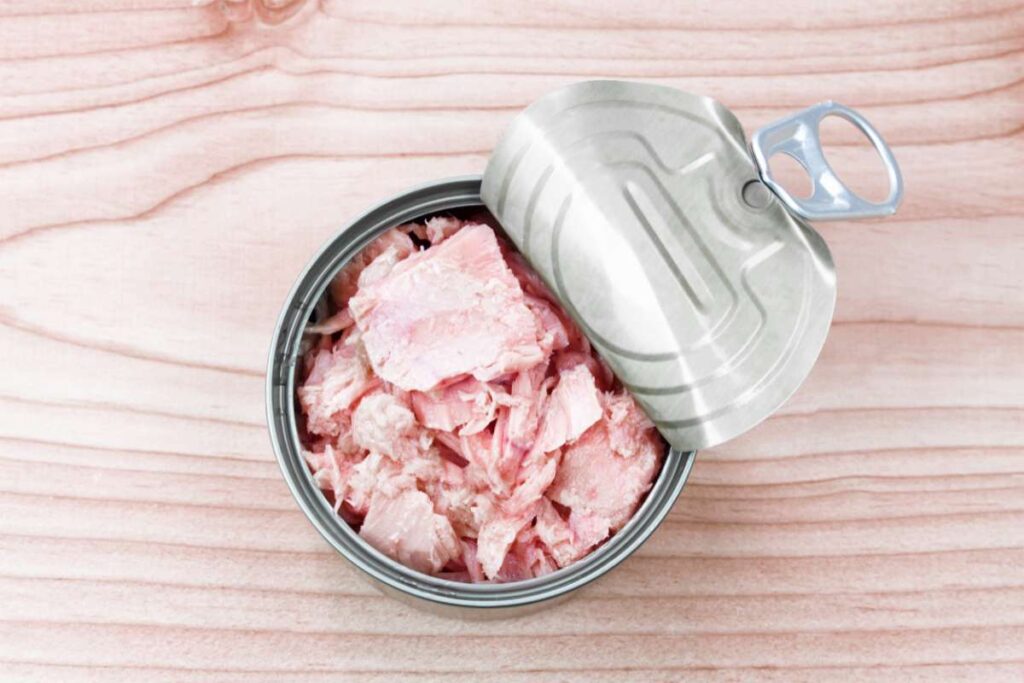
Canned tuna is a super convenient and affordable source of protein and omega-3s. It’s a popular weight-gain food due to its versatility and nutrient density.
Omega-3’s in tuna are linked to improved heart health and inflammation prevention. Opt for tuna packed in oil for even more healthy fats and calories per serving.
- Nutritional Facts (Based on 100g): 186 Calories, 0g Carbohydrates, 27g Protein, 8g
- How to Consume:
- Price per lb: $2.78
20. Beans
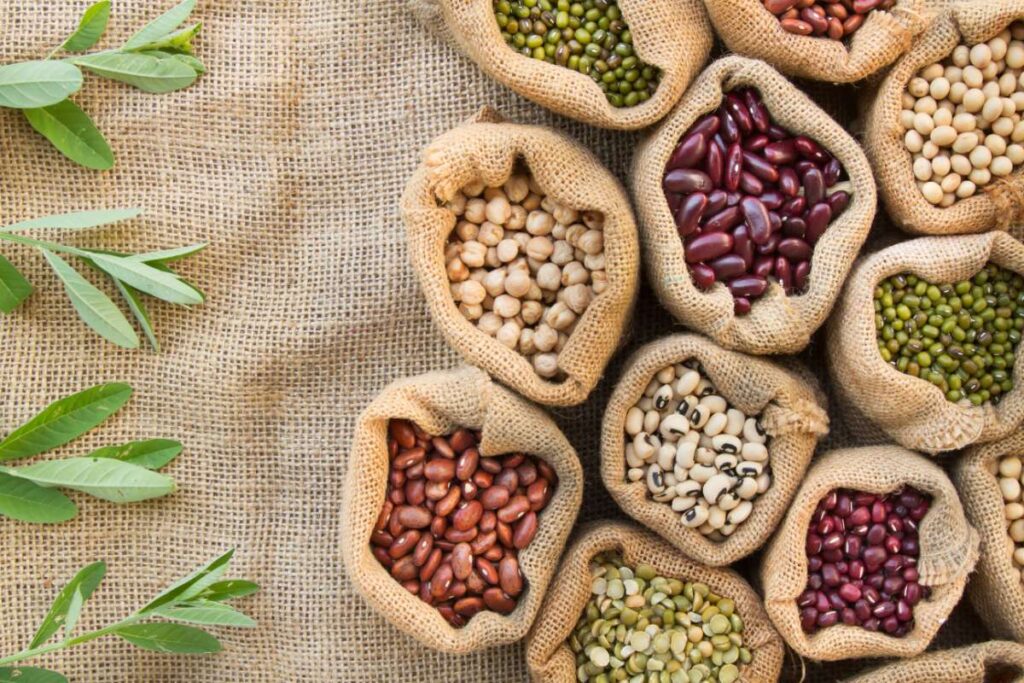
Beans are a great source of plant-based protein, antioxidants, and prebiotics. Prebiotics are fibers that promote good bacteria growth in the gut.
There are various types of beans, including black beans, kidney beans, chickpeas, and pinto beans. All of which are very affordable and nutrient-dense.
- Nutritional Facts (Raw, based on 100g): 347 Calories, 63g Carbohydrates, 21g Protein, 1.2g
- How to Consume: Use beans in soups, salads, chili, or stews. You can also make dips or homemade bean burgers with them. If you use canned beans, just make sure you rinse them before serving to remove any added sodium.
- Price per lb: $0.90
Healthy Alternatives for High-Calorie Foods
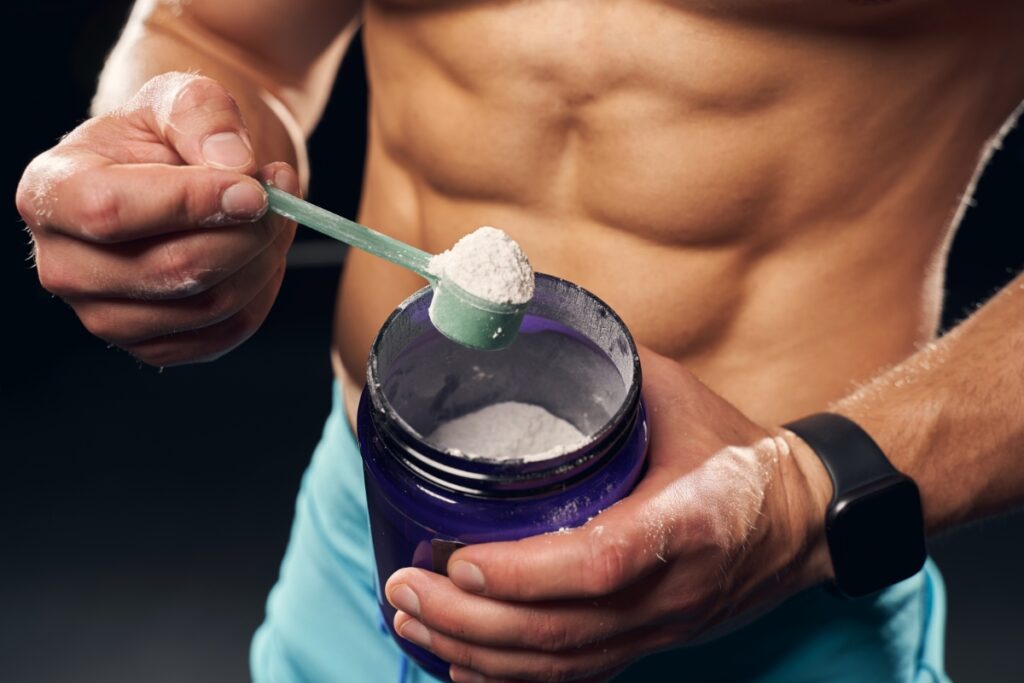
In addition to the 20 cheap, high-calorie foods mentioned above, there are also supplements that you can use to help you meet your goals.
Just remember these should be used as an additional supplement to your weight gain diet and should not replace any whole foods.
Protein Powders
Protein powders are one of my favorite additions to any muscle-building meal plan because they are a quick and budget-friendly way to add more protein and calories.
They come in various flavors and can be mixed with high-calorie milk or into a nutrient-dense smoothie.
I recommend Ka’Chava for weight gain because it’s high in calories as well as tons of micronutrients.
Meal Replacement Supplements
Meal replacement supplements provide a balanced mix of macronutrients and can be a great option for those that struggle to get extra snacks or meals in while they’re trying to gain weight.
I recommend using Lyfe Fuel as an additional meal to breakfast, lunch, and dinner to help you increase your caloric intake.
Mass Gainers
Mass gainers are specially formulated supplements that provide a huge amount of calories in a convenient powder. They usually come in at around 500-1200 calories per serving.
This supplement can be useful for those that have very high caloric needs and need to top up.
Pro Tips for Healthy Bulking

If you’re researching healthy weight gain ingredients, you may be in a bulking phase of your exercise journey. Below are some of my pro nutrition tips for achieving a successful bulk in a healthy way.
Balanced Macronutrients
While increasing calorie intake, you’ll want to make sure that you’re keeping a balanced macronutrient ratio. You don’t want to lean on one type to cover the majority of your calories (looking at you, fat).
Balance your recipes by using energy-dense proteins, carbs, and fats so you don’t miss out on any essential nutrients.
Gradual Calorie Increase
Rather than drastically increasing your calories overnight, slowly add more calories to your day over time to allow your body to adjust.
I recommend starting with adding a hundred or so calories to each meal at a time, as well as introducing a new snack. This method can reduce digestive discomfort and rapid fat gain.
Consistent Meal Timing
Establish a regular eating schedule and do your best to stick to it. Consistent meal times will help regulate your hunger, digestion, and blood sugar while ensuring you fuel your body throughout the day.
I suggest aiming for three meals and a few snacks each day at two to four-hour intervals.
Pre- and Post-Workout Nutrition
When you’re bulking, you’re focused on muscle gains- which means pre-workout fueling and post-workout recovery.
Make sure you’re fueled with lots of energizing carbs before your workout to maximize your training. Then, recover with a 2:1 ratio of carbs to protein to replenish the lost energy and repair muscle fibers.
Sufficient Protein Intake
Protein is made of amino acids, which are the building blocks of muscle. Without eating enough protein, you won’t be able to build new muscle.
Aim for approximately 1.2-1.7 grams of protein per kilogram of body weight per day or 0.5 to 0.8 grams per pound of body weight.
Hydration
Stay well-hydrated to help with nutrient absorption, energy levels, muscle function, and metabolism.
While everyone’s hydration goals differ depending on their workout routine, environment, and sweat levels, a basic guideline is 8-10 cups of water daily.
A good way to tell if you are dehydrated is to check your urine color. If it’s any darker than light yellow, you need to drink more water.
Regular Monitoring and Adjustments
Keep track of your progress by monitoring your weight, measurements, body composition, and energy levels. Adjust your caloric intake and macronutrient ratio as needed to streamline your progress toward your goals.
I definitely recommend finding a dietitian or healthcare professional to offer personalized guidance.
Conclusion
I hope you found this list of 20 cheap high-calorie foods for weight gain helpful.
Incorporating some or all of these foods into your diet can help you reach your weight gain goals and support your health journey.
Remember to focus on nutrient-dense, low-volume options. Don’t be afraid to supplement with a protein powder, meal replacement, or mass gainer if you need it.
If you have any feedback or questions, we’d love to hear your thoughts in the comments below. Don’t forget to share this article if you know anyone that is trying to gain weight.
Happy feasting, and good luck with your gains!
Frequently Asked Questions
What is the cheapest food with the highest calories?
Based on our list of 20 cheap, high calorie foods, bananas, rice, and beans are some of the cheapest ingredients while peanut butter, olive oil, and nuts are the highest in calories.
What foods are high in calories to gain weight?
To gain weight, you should eat nutrient-dense, high-calorie foods like nuts, olive oil, chicken thighs, and eggs.
How can I eat more calories on a budget?
A few ways to eat more calories on a budget include buying in bulk, going for canned or frozen foods, and going for cheap ingredients like eggs, whole-fat dairy, and peanut butter.
How can I gain weight fast on a low budget?
You could gain weight rapidly on a low budget by eating lots of fast food and refined sugars. However, it’s healthier and more sustainable to gain weight with healthy foods slowly.
How to eat 4,000 calories a day?
Split your calories into meals and snacks, so go for three 800-1,000 calorie meals and two 500-700 calorie snacks per day.
How to get 3,000 calories a day?
Split your calories into meals and snacks, so go for three 600-800 calorie meals and two 300-400 calorie snacks per day.
